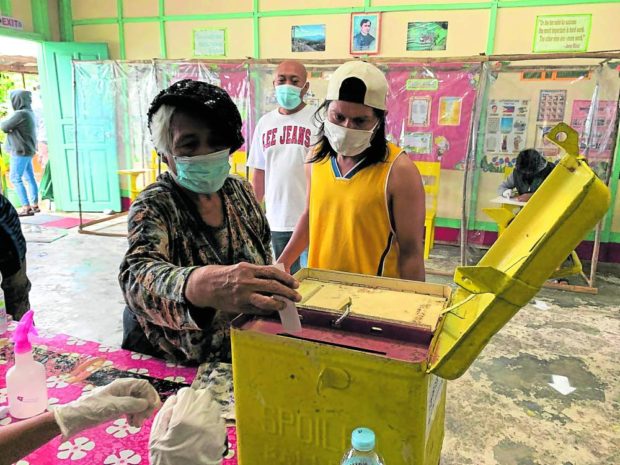
79-year-old Merly Villanueva of Barangay Panacan Uno in southern Palawan town of Narra is assisted by her son as she went out to cast her vote in a plebiscite on March 13, 2021.
MANILA, Philippines — Holding the plebiscite to amend the 1987 Constitution alongside the 2025 national and local elections is “doubtful constitutionality,” election lawyer Romulo Macalintal said on Monday.
The Initiative and Referendum Act of 1989 defines a plebiscite as a means by which Filipinos can vote to either approve or reject initiatives to change the Constitution.
“With all due respect to President Marcos, his position to hold a plebiscite to amend the constitution alongside the 2025 national and local elections (NLE) is not tenable or of doubtful constitutionality,” Macalintal said in a statement.
Last month, President Ferdinand “Bongbong” Marcos told reporters that his administration is studying the possibility of holding the plebiscite along with the elections in May 2025 to save on costs.
According to Macalintal, Section 4, Article XVII of the 1987 Constitution simply mandates that the ratification of any amendment to or revision of the country’s principal Charter shall be done “in a plebiscite,” but it does not say that the ratification shall be done “in an election,” nor in an “election and plebiscite.”
Citing a Supreme Court decision, he further argued that holding a plebiscite to ratify amendments or revisions to the country’s principal charter should be done independently and without “consideration of extraneous matters” separate from the plebiscite itself.
“In other words, any such amendment or revision should be submitted for the people’s ratification in a plebiscite ‘independently of the election of public officials’ following the opinions of the majority of the justices of the Supreme Court (SC) in the November 1967 consolidated cases of Gonzales vs. Comelec and Philconsa vs. Comelec,” Macalintal explained.
The lawyer, citing Filipino jurist Justice Jose B.L. Reyes, further stressed that amendments to the Constitution should be “debated, considered, and voted upon at an election wherein the people could devote undivided attention to the subject.”
This view is contrary to holding the plebiscite with the national and local elections as voters would effectively perform two tasks in one-sitting.
“Thus, Comelec [Commission on Elections] Chairman George Erwin Garcia was correct when he previously said that “such plebiscite cannot be done together with the May 2025 midterm elections (as it) requires a separate and single plebiscite so that the people can focus on whether they should allow such amendment or not,” Macalintal continued.
Political decision
In response to Macalintal’s statement, Comelec spokesperson John Rex Laudingco stressed anew that discussions on when to hold the plebiscite for the amendment of the Constitution is a “political question to which Comelec will not participate.”
“Being the Constitutional Institution mandated to enforce and administer election laws, rules and regulations, Comelec will abide by the acts of Congress, if ever for this matter, sitting as a Constituent Assembly,” Laudingco said in a message to reporters on Monday.
He likewise reiterated that if the plebiscite would indeed be held alongside the 2025 elections, the commission’s new Automated Elections System would be capable of handling the two election procedures.
“As with any other situation, any person may question such acts before the Supreme Court,” he noted.
Moves to amend the Constitution sparked in January of this year when pro-Charter change (Cha-cha) group People’s Initiative for Reform Modernization and Action started collecting signatures for Cha-cha via people’s initiative.
This campaign was followed by a discord between the two chambers of Congress on who would lead the initiatives to amend the economic provisions of the Charter.